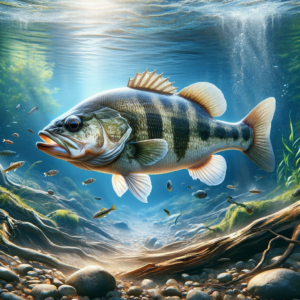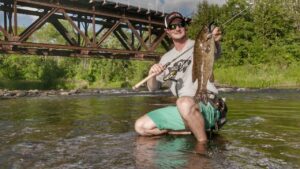Have you ever wondered if smallmouth bass eat baby bass? Well, you’re in the right place to find out! Smallmouth bass are known for their voracious appetite, but do they really prey on their own young? In this article, we will explore the feeding habits of smallmouth bass and whether or not they indulge in cannibalism.
Smallmouth bass, like many other predatory fish, have a diverse diet that includes insects, crayfish, and other small fish. While they primarily feed on these smaller prey items, there have been instances where smallmouth bass have been observed consuming their own offspring. However, it’s important to note that this behavior is not the norm and is typically a result of specific environmental conditions.
Interestingly, smallmouth bass will only eat their own young if there is a shortage of other available food sources. In times when their preferred prey is scarce, they may resort to cannibalism as a means of survival. Additionally, larger females tend to be more cannibalistic than males, as they have a higher energy requirement for egg production.
In conclusion, while smallmouth bass are generally not known for eating their own young, it is a behavior that can occur under certain circumstances. By understanding the feeding habits of these fascinating fish, we can gain greater insight into their overall ecological role and behavior. To learn more about this topic, keep reading our article!
Smallmouth Bass Diet
Smallmouth Bass Feeding Habits
Smallmouth bass (Micropterus dolomieu) are predatory fish known for their aggressive feeding behavior. They are opportunistic feeders, meaning they will consume a wide range of prey items. Their feeding habits are influenced by their habitat, activity patterns, and feeding preferences.
Prey of Smallmouth Bass
Smallmouth bass primarily feed on small aquatic organisms, including insects, crustaceans, and fish. They are known to consume a variety of prey fish species, making them an important predator in freshwater ecosystems.
Do Smallmouth Bass Eat Baby Bass?
Smallmouth bass are known to eat their own young, including baby bass. These predatory fish do not discriminate when it comes to their diet and will consume any small fish that they can overpower. However, the extent to which smallmouth bass prey on baby bass depends on various factors.
Dietary Behavior of Smallmouth Bass
Smallmouth bass have a diverse diet, but their preference for specific prey species can vary depending on the availability of food sources. While they may consume baby bass when given the opportunity, their diet consists of various other prey items as well.
Instances of Smallmouth Bass Eating Baby Bass
There have been numerous documented instances of smallmouth bass preying on baby bass. In some cases, angler observations and scientific studies have confirmed that smallmouth bass actively target and consume their own offspring. This predatory behavior can have significant implications for the population dynamics of both smallmouth bass and baby bass.
Impact of Smallmouth Bass Predation on Baby Bass Population
The predation of baby bass by smallmouth bass can have both direct and indirect effects on the baby bass population. Directly, the consumption of baby bass by smallmouth bass reduces their numbers, potentially leading to a decline in the population. Indirectly, the fear of predation can alter the behavior and habitat selection of baby bass, affecting their overall recruitment and survival rates.
Factors Affecting Smallmouth Bass Diet
Several factors influence the diet of smallmouth bass, including the availability of prey fish, the size and age of the smallmouth bass, and environmental conditions. Understanding these factors is crucial in determining the feeding behavior of smallmouth bass and their interactions with other fish species.
Availability of Prey Fish
The availability of prey fish plays a significant role in shaping the diet of smallmouth bass. When there is an abundance of specific prey fish species, smallmouth bass may focus their feeding efforts on consuming those fish. Baby bass, being small and vulnerable, can become an easy target for smallmouth bass when they are in abundance.
Size and Age of Smallmouth Bass
The size and age of smallmouth bass also influence their feeding habits. As smallmouth bass grow larger, they are capable of overpowering larger prey items. However, smaller individuals may primarily rely on smaller prey, such as baby bass, to fulfill their nutritional needs.
Environmental Factors Affecting Smallmouth Bass Feeding
Environmental factors, such as water temperature, water clarity, and seasonal changes, can impact the feeding behavior of smallmouth bass. These factors can influence the availability of prey fish and their behavior, which in turn affects the diet of smallmouth bass. It is important to consider these factors when studying the feeding habits of smallmouth bass.
Interactions Between Smallmouth Bass and Baby Bass
The interactions between smallmouth bass and baby bass are complex and dynamic. Smallmouth bass are natural predators, while baby bass are often considered prey. This predator-prey relationship results in various behavioral dynamics between the two species.
Behavioral Dynamics Between Smallmouth Bass and Baby Bass
When in the presence of smallmouth bass, baby bass exhibit predator avoidance behaviors. They may seek refuge in vegetation, stay close to cover, or swim in schools to increase their chances of survival. Smallmouth bass, on the other hand, employ hunting tactics and use their speed and agility to capture their prey.
Predator-Prey Relationship in Smallmouth Bass and Baby Bass
The predator-prey relationship between smallmouth bass and baby bass is essential for maintaining a balanced ecosystem. While smallmouth bass prey on baby bass, this predation helps regulate the population of baby bass and prevents their numbers from overwhelming their food resources.
Importance of Baby Bass in Smallmouth Bass Diet
Baby bass, despite being prey for smallmouth bass, serve as an important food source for their growth and survival. Baby bass offer nutritional value to smallmouth bass, ensuring their health and vitality. This makes the conservation of baby bass populations crucial for the overall well-being of smallmouth bass populations.
Nutritional Value of Baby Bass as Prey
Baby bass provide smallmouth bass with essential nutrients, including proteins and fats, necessary for their growth and reproduction. The high energy content of baby bass allows smallmouth bass to thrive and maintain their optimal body condition.
Role of Baby Bass in Smallmouth Bass Growth and Survival
The presence of baby bass in the diet of smallmouth bass directly impacts their growth and survival rates. By consuming baby bass, smallmouth bass have access to a nutritious food source that promotes their development and enhances their chances of survival in their habitat.
Significance of Baby Bass as Prey in Ecosystem
The predation of baby bass by smallmouth bass has broader ecological significance. It helps regulate the baby bass population, preventing the overcrowding of these young fish. Furthermore, it influences the behavior and distribution of baby bass, thereby shaping the structure and dynamics of the overall fish community.
Conservation Measures
To protect baby bass populations, conservation strategies can be implemented. These can include regulations on fishing smallmouth bass, such as size and bag limits. By controlling the number of smallmouth bass caught, the pressure on baby bass populations can be reduced, ensuring their long-term survival.
Habitat Restoration for Smallmouth Bass
Habitat restoration is another important conservation measure for smallmouth bass and baby bass. By improving the quality and availability of suitable habitats, baby bass can find refuge, increasing their chances of survival. Restoring riparian vegetation, maintaining water quality, and protecting nursery areas are all crucial for the well-being of baby bass populations.
Conclusion
Understanding the feeding behavior of smallmouth bass and their predation on baby bass is essential for the conservation and management of these fish populations. Smallmouth bass are opportunistic feeders that can consume a wide range of prey, including baby bass. While the predation of baby bass by smallmouth bass may have implications for their population dynamics, it also serves as an important food source for the growth and survival of smallmouth bass. Therefore, conserving baby bass populations and implementing effective conservation measures is crucial for maintaining healthy fish communities in freshwater ecosystems.




